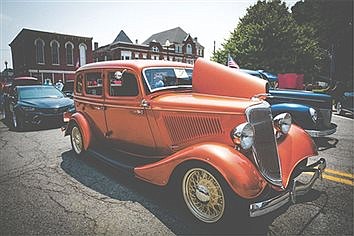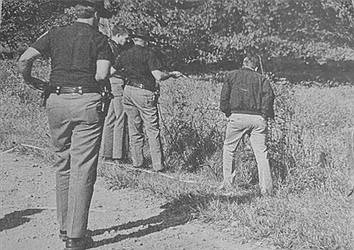Honoring those who serve: The Fourth of July celebrates America's freedom
July 6, 2022 at 6:45 p.m.

The Fourth of July is also known as Independence Day. It has been a federal holiday in the United States since 1941. Still, the tradition of Independence Day celebrations goes back to the 18th century and the American Revolution.
On July 2, 1776, the Continental Congress voted in favor of independence. Two days later, delegates from the 13 colonies adopted the Declaration of Independence. The document was drafted by Thomas Jefferson and was the birth of American Independence.
The initial battles in the Revolutionary War began in April 1775. At this time, few colonists supported complete independence from Great Britain. However, by the following year, many changed their position as hostility between Britain grew. On June 7, Continental Congress met at the Pennsylvania State House, where the Virginia delegate Richard Henry Lee brought forth a motion calling for the colonies’ independence.
Amid a heated debate, Congress postponed the vote on Lee's resolution. However, a five-person committee was appointed to draft a formal statement justifying the break with Great Britain and included Thomas Jefferson of Virginia, John Adams of Massachusetts, Roger Sherman of Connecticut, Benjamin Franklin of Pennsylvania, and Robert R. Livingston of New York.
On July 2, the Continental Congress voted in favor of Lee's resolution for independence in a near-unanimous vote. Following the vote, John Adams wrote to his wife Abigail, writing July 2 "will be celebrated, by succeeding Generations, as the great anniversary Festival" and that the celebration should include "Pomp and Parade…Games, Sports, Guns, Bells, Bonfires, and Illuminations from one End of this Continent to the other." On July 4, the Continental Congress formally adopted the Declaration of Independence. Massachusetts became the first state to make July 4 an official state holiday.
After the Revolutionary War, Americans continued to commemorate Independence Day every year in celebrations that allowed the new nation's emerging political leaders to address citizens and create a feeling of unity.
The tradition of setting off fireworks on July 4 began in Philadelphia on July 4, 1777, during the first organized celebration of Independence Day. The ship's cannon fired a 13-gun salute in honor of the 13 colonies. The Pennsylvania Evening Post reported: "at night, there was a grand exhibition of fireworks (which began and concluded with thirteen rockets) on the Commons, and the city was beautifully illuminated." That same night, the Sons of Liberty set off fireworks over Boston Common.
The July Fourth celebration became even more widespread after the War of 1812, in which the United States again faced Great Britain. In 1870, the U.S. Congress made July 4 a federal holiday; in 1941, the provision was expanded to grant a paid holiday to all federal employees.
Independence Day represents so much about the American story - freedom, bravery and patriotism.
“So let freedom ring from the prodigious hilltops of New Hampshire. Let freedom ring from the mighty mountains of New York. Let freedom ring from the heightening Alleghenies of Pennsylvania! Let freedom ring from the snow-capped Rockies of Colorado! Let freedom ring from the curvaceous peaks of California! But not only that; let freedom ring from Stone Mountain of Georgia! Let freedom ring from Lookout Mountain of Tennessee! Let freedom ring from every hill and every molehill of Mississippi. From every mountainside, let freedom ring.” – Martin Luther King Jr.
Latest News
E-Editions
Events
The Fourth of July is also known as Independence Day. It has been a federal holiday in the United States since 1941. Still, the tradition of Independence Day celebrations goes back to the 18th century and the American Revolution.
On July 2, 1776, the Continental Congress voted in favor of independence. Two days later, delegates from the 13 colonies adopted the Declaration of Independence. The document was drafted by Thomas Jefferson and was the birth of American Independence.
The initial battles in the Revolutionary War began in April 1775. At this time, few colonists supported complete independence from Great Britain. However, by the following year, many changed their position as hostility between Britain grew. On June 7, Continental Congress met at the Pennsylvania State House, where the Virginia delegate Richard Henry Lee brought forth a motion calling for the colonies’ independence.
Amid a heated debate, Congress postponed the vote on Lee's resolution. However, a five-person committee was appointed to draft a formal statement justifying the break with Great Britain and included Thomas Jefferson of Virginia, John Adams of Massachusetts, Roger Sherman of Connecticut, Benjamin Franklin of Pennsylvania, and Robert R. Livingston of New York.
On July 2, the Continental Congress voted in favor of Lee's resolution for independence in a near-unanimous vote. Following the vote, John Adams wrote to his wife Abigail, writing July 2 "will be celebrated, by succeeding Generations, as the great anniversary Festival" and that the celebration should include "Pomp and Parade…Games, Sports, Guns, Bells, Bonfires, and Illuminations from one End of this Continent to the other." On July 4, the Continental Congress formally adopted the Declaration of Independence. Massachusetts became the first state to make July 4 an official state holiday.
After the Revolutionary War, Americans continued to commemorate Independence Day every year in celebrations that allowed the new nation's emerging political leaders to address citizens and create a feeling of unity.
The tradition of setting off fireworks on July 4 began in Philadelphia on July 4, 1777, during the first organized celebration of Independence Day. The ship's cannon fired a 13-gun salute in honor of the 13 colonies. The Pennsylvania Evening Post reported: "at night, there was a grand exhibition of fireworks (which began and concluded with thirteen rockets) on the Commons, and the city was beautifully illuminated." That same night, the Sons of Liberty set off fireworks over Boston Common.
The July Fourth celebration became even more widespread after the War of 1812, in which the United States again faced Great Britain. In 1870, the U.S. Congress made July 4 a federal holiday; in 1941, the provision was expanded to grant a paid holiday to all federal employees.
Independence Day represents so much about the American story - freedom, bravery and patriotism.
“So let freedom ring from the prodigious hilltops of New Hampshire. Let freedom ring from the mighty mountains of New York. Let freedom ring from the heightening Alleghenies of Pennsylvania! Let freedom ring from the snow-capped Rockies of Colorado! Let freedom ring from the curvaceous peaks of California! But not only that; let freedom ring from Stone Mountain of Georgia! Let freedom ring from Lookout Mountain of Tennessee! Let freedom ring from every hill and every molehill of Mississippi. From every mountainside, let freedom ring.” – Martin Luther King Jr.





